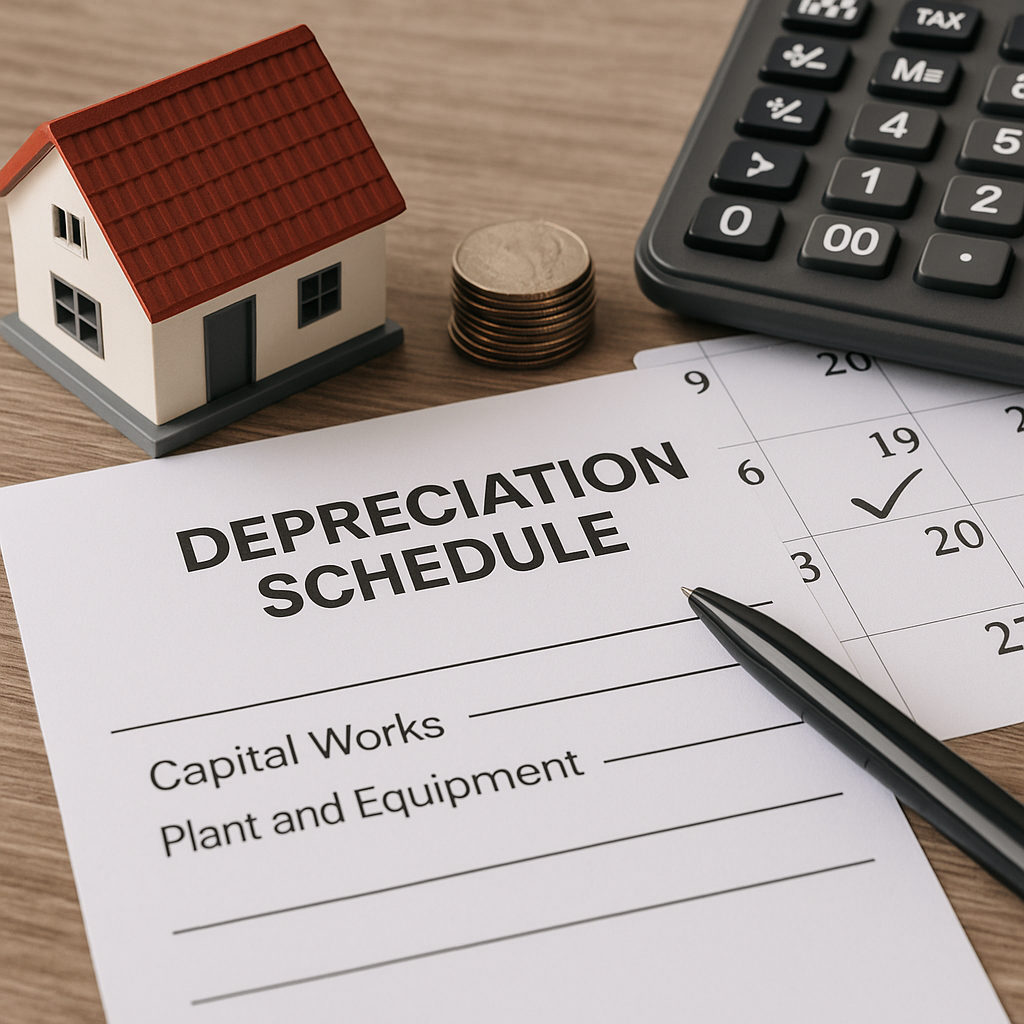Maximize Your Investment Property Returns with Depreciation Schedules: Here’s How.
When it comes to property investment, every investor knows that maximizing returns is key. But did you know that one of the most effective ways to boost your investment returns might be right under your nose? It’s called a depreciation schedule, and it could save you thousands in tax deductions each year. But what exactly is it, who prepares it, and why should you care?
Let’s dive in and explore how a depreciation schedule can work for you and why it’s a must-have for every property investor.
What is a Depreciation Schedule?
Simply put, a depreciation schedule is a document that tracks the decline in value of your investment property over time. It identifies the depreciation of your property’s building and assets, such as the structure, appliances, flooring, and other features, and translates that into valuable tax deductions. This means that as your property ages, you can claim deductions on the wear and tear of its components, reducing your taxable income and ultimately saving you money.
For example, your property’s roof, walls, carpets, or even the appliances like a stove or fridge will naturally lose value over time. By using a depreciation schedule, you can account for those losses as tax deductions, boosting your cash flow while reducing your tax liability.
Who Prepares a Depreciation Schedule?
Now, you might be wondering: who can prepare such a detailed report? The answer is a qualified Quantity Surveyor (QS). These professionals are trained to assess the construction costs of a property and determine what can be depreciated. Their expertise ensures that you don’t miss out on any potential deductions.
The Australian Taxation Office (ATO) requires that depreciation schedules be completed by someone with the right qualifications. So, it’s essential to hire a professional to ensure your schedule complies with tax laws and maximizes your deductions.
Why Depreciation Schedules Are Essential for Investors
1. Unlock Tax Savings
One of the biggest benefits of a depreciation schedule is the tax savings. Depreciation allows you to lower your taxable income, which means you will pay less in taxes. This is especially useful in the early years of property investment, where the property value may not have appreciated significantly yet, but you can still claim significant deductions for the depreciation of the building and assets.
2. Maximize Investment Potential
A depreciation schedule isn’t just about saving on taxes; it’s also a powerful tool to maximize the value of your investment property. By identifying all depreciable assets, you ensure you are capturing every available deduction. This can significantly improve your overall returns, especially for investors who are keen on maximizing their cash flow or reducing the costs of holding the property.
3. Plan Your Finances Better
Knowing how much depreciation you can claim each year allows for accurate financial planning. With a clear idea of how much depreciation is being deducted, you can more effectively manage your property portfolio, reinvest those savings, and plan for future investments. It’s a strategy that helps make your overall investment journey smoother.
4. Understand Capital Gains Tax Implications
While depreciation helps reduce your annual tax bill, it also impacts your Capital Gains Tax. The ATO takes into account the depreciation claimed when calculating your property’s capital gain at the time of sale. Having a depreciation schedule can help you understand how these deductions affect your CGT liability, so you are better prepared for the financial implications when you sell.
Real-Life Example: How Depreciation Saved Sarah Thousands
Let’s bring this to life. Take Sarah, an investor based in Brisbane who recently purchased a rental property. At first, Sarah didn’t know much about depreciation, but after a quick consultation with a Quantity Surveyor, it turned out her property was eligible for over $10,000 in depreciation deductions in the first year alone!
This deduction helped reduce her taxable income, meaning less tax to pay and more money in her pocket to reinvest in her property portfolio. Without a depreciation schedule, Sarah would have missed out on this tax-saving opportunity, which is why this simple step is crucial for anyone serious about property investing.
How to Get Started with Depreciation
If you are thinking about setting up a depreciation schedule for your investment property, the first step is to contact a qualified Quantity Surveyor. They will assess your property and prepare a detailed report tailored to your specific situation.
If you haven’t yet organized a depreciation schedule for your current investment properties, now’s the time to do it. Not only can it help reduce your tax liability, but it can also significantly enhance your overall investment strategy.
I can recommend suitable Quantity Surveyors who specialize in preparing depreciation schedules for investment properties, ensuring you get the most accurate and compliant report for your situation. Feel free to reach out if you need assistance in connecting with the right professionals.
Let’s Talk About Your Investment Strategy
If you are unsure where to start or need help navigating the complexities of property investment and depreciation, I’m here to help. As a qualified property investment advisor and buyers agent, I work with investors like you to make sure you are maximizing your investment potential at every turn.
Whether you are new to property investment or looking to refine your current strategy, contact me today to discuss how a depreciation schedule can work for you and your portfolio.
Key Takeaways:
– A depreciation schedule helps you claim valuable tax deductions based on the decline in value of your property and its assets.
– You need to hire a qualified Quantity Surveyor to prepare an accurate and compliant schedule.
– It helps lower your taxable income, improves cash flow, and allows for better financial planning.
– It also affects Capital Gains Tax and provides a clearer picture of your investment’s overall financial performance.
Ready to optimize your investment strategy and claim your deductions? Let’s chat today!







